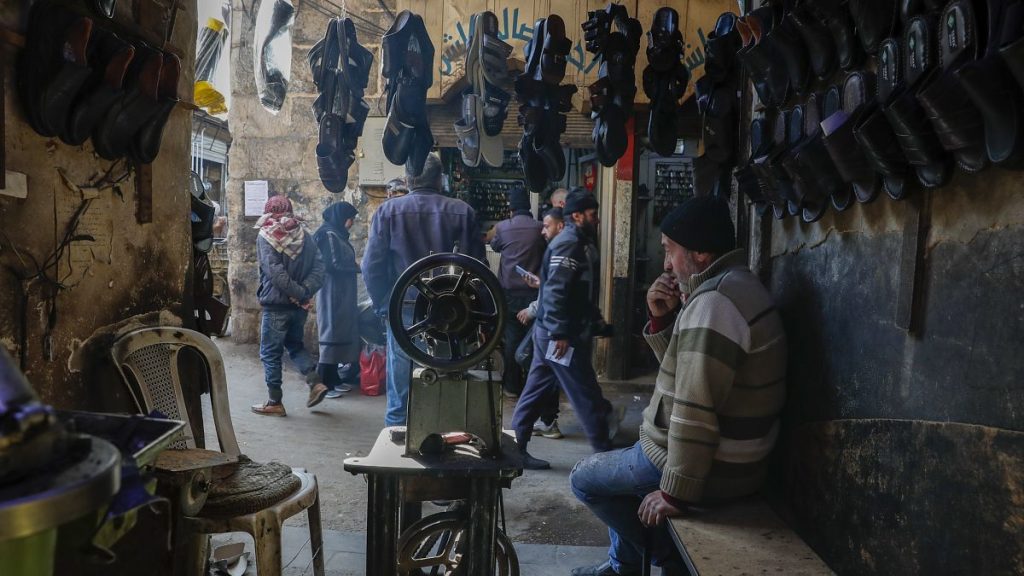In a significant diplomatic shift, US President Donald Trump has announced plans to normalize relations with Syria’s new government, led by interim President Ahmad al-Sharaa. This decision comes as part of a broader effort to promote peace in the war-torn country, prompted by regional leaders including Saudi Crown Prince Mohammed bin Salman and Turkish President Recep Tayyip Erdoğan. As the former insurgent responsible for overthrowing long-term leader Bashar al-Assad, al-Sharaa is now poised to engage with the US for potential cooperation and dialogue.
| Article Subheadings |
|---|
| 1) Background of Syria’s New Leadership |
| 2) Regional Reactions to Trump’s Announcement |
| 3) Historical Context of US-Syria Relations |
| 4) Implications of Changing Diplomacy |
| 5) Future Prospects for Syrian Peace |
Background of Syria’s New Leadership
The appointment of Ahmad al-Sharaa as interim president marks a significant pivot in Syria’s political landscape. Al-Sharaa, once a leading figure in the insurgency against the Assad regime, took power following a coordinated offensive by various insurgent groups, culminating in the overthrow of Bashar al-Assad‘s 54-year rule. The offensive was especially notable for its speed and intensity, effectively capturing Damascus and signaling the end of a political dynasty that had dominated Syria for decades. Al-Sharaa’s rise can also be analyzed through the lens of his history, as he previously fought against US forces in Iraq and has had questionable ties to extremist groups. His past affiliations have raised eyebrows, complicating the US’s stance on officially recognizing his leadership.
Regional Reactions to Trump’s Announcement
In response to President Trump’s comments, the reaction from regional leaders has been cautiously optimistic. Mohammed bin Salman and Recep Tayyip Erdoğan have voiced support for displaying a unified front against Iranian influence in Syria. The Gulf nations view normalization as crucial for establishing a stable regime in Damascus, particularly as they see this as a countermeasure to Iran’s expansive presence in the Middle East. Furthermore, various analysts have suggested that this diplomatic overture could offer a lifeline for Syria, which has faced a prolonged humanitarian crisis due to a decade-long civil war. However, skepticism remains, especially from Israel, which continues to have lingering doubts about al-Sharaa’s government’s intentions and its potential repercussions for regional security.
Historical Context of US-Syria Relations
Historically, US-Syria relations have been fraught with tension, particularly due to Syria’s alliances with the Soviet Union during the Cold War and its current support for Iran. The Assad regime was often viewed through a lens of hostility, with numerous sanctions imposed as a deterrent against perceived aggression and terrorism-related activities. The recent shift in US policy, however, reflects an acknowledgment that the geopolitical landscape in the Middle East is evolving. Trump’s willingness to engage with al-Sharaa indicates a possible recalibration of US foreign policy, which previously relied on a strict containment strategy aimed at isolating Syria and its leadership.
Implications of Changing Diplomacy
By opening diplomatic channels with the new Syrian administration, President Trump is signaling a willingness to reconsider the previous hardline stance. Experts suggest that a successful engagement might pave the way for broader discussions on issues including Syria’s reconstruction and addressing humanitarian needs. While the US has yet to formally lift sanctions or recognize the new government, the ongoing dialogue may indicate a gradual shift towards collaboration. Analysts highlight that Trump’s engagement could influence other countries in the region to reconsider their positions regarding Syria, balancing long-held grievances with newfound opportunities for cooperation.
Future Prospects for Syrian Peace
Looking ahead, the future of peace and stability in Syria hinges on several factors, including the continued engagement of international powers and the ability of the new leadership to unify the fractured country. With Iran’s footprint in Syria under scrutiny and Russia’s influence also beginning to wane, al-Sharaa has an opportunity to demonstrate his capability in fostering a new political culture based on dialogue rather than division. Experts believe that if the newly recognized government can deliver on basic governance and security, it may lead to a more resilient society. However, skepticism about al-Sharaa’s ability to navigate such complex dynamics remains prevalent, and the upcoming negotiations will be pivotal in charting the country’s future.
| No. | Key Points |
|---|---|
| 1 | President Trump is moving to normalize relations with Syria’s new government under Ahmad al-Sharaa. |
| 2 | The change comes at the urging of regional leaders, including Saudi Crown Prince Mohammed bin Salman. |
| 3 | Al-Sharaa’s presidency follows the overthrow of Bashar al-Assad, marking a pivotal shift in Syrian governance. |
| 4 | Skepticism remains from traditional allies, notably Israel, regarding the new government’s intentions. |
| 5 | The potential normalization of relations may lead to discussions on sanctions and humanitarian aid. |
Summary
In summary, President Trump’s announcement to engage with Syria’s new leadership represents a potential turning point in international diplomatic relations surrounding the conflict-ridden nation. The influence of regional leaders, especially in counteracting Iranian ascendance and facilitating peace talks, may prove crucial for both Syria’s internal stability and broader Middle Eastern geopolitics.
Frequently Asked Questions
Question: Who is Ahmad al-Sharaa?
Ahmad al-Sharaa is the interim President of Syria, who came to power after leading an offensive that overthrew Bashar al-Assad, marking a significant change in the country’s governance.
Question: Why is Trump’s approach to Syria important?
Trump’s approach signifies a potential shift in US foreign policy, moving toward normalization with a new government that seeks to establish peace and stability in Syria.
Question: What role do regional leaders play in this scenario?
Regional leaders, particularly Crown Prince Mohammed bin Salman and Turkish President Recep Tayyip Erdoğan, are encouraging the normalization process, viewing it as a strategy to counter Iranian influence in Syria.



